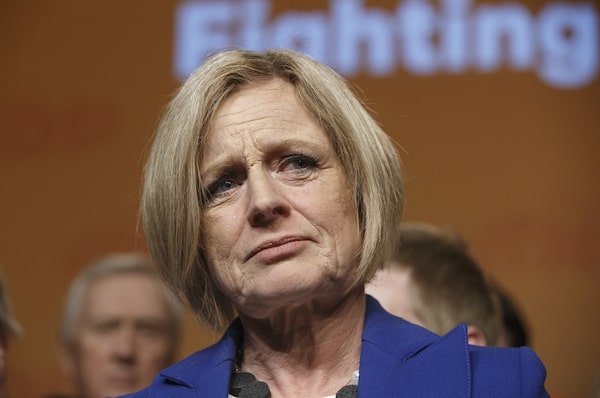
NDP leader Rachel Notley gives a concession speech after the provincial election in Edmonton on April 16, 2019.JASON FRANSON/The Canadian Press
Alberta’s Opposition New Democrats will be spending the next several months releasing detailed proposals aimed at reshaping the province’s economy, as the party attempts to increase its credibility on an issue that is widely seen to have contributed to the party’s election defeat last year.
NDP Leader Rachel Notley, who was premier during the party’s four-year term and plans to stay on as leader for the next election in 2023, will outline a plan Thursday in which her party will release a series of discussion papers on a range of economic files including hydrogen, geothermal power, postsecondary education, child care and affordable housing, among others.
The party will solicit input from the public, experts, industry associations and other groups as it builds an economic plan that will eventually underpin the NDP’s election platform in 2 1/2 years. The campaign is called Alberta’s Future.
The process comes at a time when the province has been upended by the COVID-19 pandemic and a collapse in oil prices earlier this year, which together threw an economy that had already been struggling for years into a fresh tailspin. That reality, Ms. Notley argues, has left the public eager for a conversation about what the economy should look like, not just during the immediate recovery, but over the next few decades.
She said the goal is to reach not just NDP supporters but also people who traditionally see the United Conservative Party or its conservative predecessors as the strongest option for the economy.
“Quite frankly, it’s a 50-year brand that the conservatives enjoy the benefit of and we do not,” Ms. Notley said in an interview.
"It’s about positioning ourselves as a party that is equipped and willing and driven to talk with Albertans with respect to economic growth. Because we know that that’s what people are very, very concerned about right now. "
The NDP will release its first discussion paper on Friday, outlining its ideas to develop a hydrogen industry in the province. Ms. Notley said the paper will include concrete recommendations such as immediately building an inventory of hydrogen infrastructure to determine what else is needed, as well as working to develop incentive programs to ensure Alberta can compete with other jurisdictions.
She criticized the UCP government’s hydrogen plan, announced earlier this month, as a vague document that included few concrete details. The government promised to come up with a “road map” for the industry by 2023.
The NDP’s work will initially focus on resources, energy and postsecondary education. Later in the year, the party will work on health and child care, which she said also should be viewed as economic strategies.
“We think that the economic recovery must be equitable,” she said.
The UCP government has made several recent announcements aimed at diversifying the province’s economy, such as the hydrogen strategy, a plan to develop the plastic and recycling industries, and legislation to encourage geothermal power projects. The government has also criticized the NDP for failing to move fast enough on those issues while in power.
The province’s postpandemic recovery plan, announced over the summer, promised additional work on many of the same issues the NDP are targeting. Some of that is expected to be the focus of the fall session of the legislature, which begins next week.
Lori Williams, a political science professor at Mount Royal University in Calgary, said there’s no question the economy was a major factor in last year’s election, and the NDP will need to overcome the perception that it is not particularly strong on that issue.
On the other hand, Prof. Williams said the province’s current economic challenges provides an opening for new policy proposals. She said if the province continues to struggle, the NDP could argue that the UCP’s main theme of the 2019 campaign – jobs, economy and pipelines – hasn’t worked.
“This is, I think, a very good time for anybody with alternatives to try and bring them forward,” she said.
“Whether those alternatives get adopted because Albertans elect a new government or because the existing government actually realized that there is a better way, I think the people of Alberta could potentially win.”
The NDP will also need to answer questions about why some of this work didn’t happen during the NDP’s time in office, said Chaldeans Mensah, who teaches political science at MacEwan University in Edmonton.
“That is going to be a fair criticism of the NDP, particularly as they push on issues like diversification of the economy," Dr. Mensah said.
“The obvious question is: ‘What did you do when you were in office?’ ”
Still, Dr. Mensah said the NDP will be able to argue that it made progress on this issue while in office with several diversification measures, such as subsidies for the tech industry, which were reversed by the current government only to be partly restored.
We have a weekly Western Canada newsletter written by our B.C. and Alberta bureau chiefs, providing a comprehensive package of the news you need to know about the region and its place in the issues facing Canada. Sign up today.